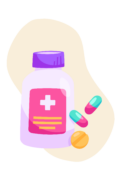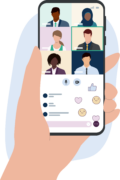From diagnosis to daily life: Finding the right support for ADHD and autism
A diagnosis of ADHD or autism can bring clarity after years of uncertainty. For many, it validates lived experience and offers a framework for understanding past challenges. Yet diagnosis is only the beginning, it raises new questions about identity, support and next steps.
If you’re considering an ADHD or autism assessment, or you’ve recently received a diagnosis, you may be thinking about what comes next. What does this mean for your future? What kind of support is available? How can you take the next step with confidence? If so, this article is for you.
Table of contents
- Understanding your emotions after diagnosis
- Building confidence through understanding
- Medication: A helpful tool, not the whole solution
- Types of ADHD medication
- Growing and changing with your diagnosis
- A balanced approach: Combining learning and medical support
- Already have a diagnosis? We’re here for you too
- What post-diagnostic support looks like
- Why digital support works
- Who we support
- Taking the next steps after diagnosis
Understanding your emotions after diagnosis

Whether the diagnosis is for yourself or your child, it’s normal to feel a mix of emotions. Relief, grief, hope and uncertainty often coexist. Parents sometimes wish they’d recognised the signs sooner. Adults may reflect on missed opportunities or misunderstood behaviours. Teenagers might find themselves questioning who they are or how they fit in.
At Xyla, we start with compassion. Our post-diagnostic support sessions are designed to meet you where you are; emotionally, cognitively and practically. You are given space to ask questions, express concerns and begin the journey of self-understanding.
Building confidence through understanding
A big part of post-diagnostic support is learning more about how ADHD or autism shows up in daily life. This process of building understanding and confidence is often called psychoeducation and it’s a central part of Xyla’s approach. It helps individuals and families understand what a diagnosis of ADHD or autism means in everyday life. Rather than focusing solely on clinical definitions, psychoeducation makes sense of behaviours, emotions and experiences through a neurodivergent lens.
Our post-diagnostic support sessions provide clarity and reassurance. They explain how traits such as sensory sensitivity, emotional intensity or difficulty with transitions part of a broader neurological profile are. For many, this understanding brings relief and a renewed sense of self.
These sessions are informative and practical. You’ll learn about:
- How ADHD and autism present in daily life
- How traits may change across different stages of development
- Strengths commonly associated with neurodivergence
- Strategies for managing routines, transitions and sensory or emotional overload
Support is always tailored to you.
- For children, this might include visual schedules, calming techniques or sensory-friendly adaptations.
- Teenagers may focus on emotional regulation, identity and peer relationships.
- Adults often benefit from tools that support executive functioning, such as time management strategies and communication techniques.
Parents and caregivers are also supported every step of the way. Their involvement is key to ensuring that strategies are applied consistently and effectively at home. By helping families understand the diagnosis, Xyla enables them to respond with empathy, structure and confidence. Our aim is simple: to give you practical tools and understanding that make daily life easier and more fulfilling.
Medication: A helpful tool, not the whole solution
One of the most common questions following an ADHD diagnosis is whether to consider medication.
For many people, both stimulant and non-stimulant medications can offer meaningful benefits, such as improved focus, reduced impulsivity and better emotional regulation. However, medication is not a cure. It is a supportive tool that works best when integrated with psychoeducation, practical strategies and lifestyle adjustments.
Medication may not be suitable for everyone. Things like physical health, mental health and personal sensitivity all play a part in whether it’s suitable. A full assessment with a healthcare professional is always important before starting or changing any treatment.

Types of ADHD medication
Finding the right medication can take time and patience. It may involve some trial and error to get the best fit. What works well for one person might not for another.
Stimulants, such as lisdexamfetamine and dexamphetamine, are typically the first-line treatment due to their fast-acting nature and evidence-based effectiveness. Yet even within this category, formulations vary; short-acting, long-acting, extended-release. As a result, the way these medications impact people can differ widely.
Non-stimulant medications, including atomoxetine, guanfacine and clonidine, are often considered when stimulants are not suitable or well-tolerated. These alternatives tend to have a slower onset and may be better suited for people with co-occurring anxiety or sleep difficulties.
Growing and changing with your diagnosis
Neurodivergence isn’t a static condition. As you grow and your life circumstances evolve through school transitions, workplace demands or hormonal changes, medication and treatment needs may shift. Ongoing support and regular reviews are essential to ensure treatment remains appropriate and effective.
For autism, medication doesn’t treat the condition itself, but it can sometimes help with related challenges such as anxiety, sleep issues or low mood. These decisions are always highly individual and should be made in discussion with a prescribing clinician.
While Xyla does not currently prescribe medication, our clinicians play a vital role in helping individuals understand their options. This includes exploring what medications you may be offered, identifying potential side effects and supporting you to advocate for yourself or your child during clinical consultations. The goal is to ensure that any decision around medication is informed, personalised and part of a holistic plan for your or your child’s wellbeing.
A balanced approach: Combining learning and medical support
For many people, the most effective support combines psychoeducation (learning and practical strategies) with medication. These approaches serve different but complementary roles.
Medication can make it easier to focus and regulate emotions, while psychoeducation helps you understand your mind and apply practical tools that work in real life. Together, they can create a stronger foundation for confidence, self-understanding and daily stability.
Our clinicians will help you explore both options, understanding how each supports the other. Working together, you’ll develop a plan that feels right for you.
Already have a diagnosis? We’re here for you too
Whether your diagnosis came through the NHS, a private provider or elsewhere, meaningful post-diagnostic support is just as important. You don’t need to start over.
At Xyla, we welcome everyone. You’ll simply share your diagnostic report so we can tailor support to your unique needs. Our goal is continuity, not duplication, giving you access to the same compassionate, specialist-led care no matter where your journey began.
What post-diagnostic support looks like
At Xyla, post-diagnostic support is structured to provide clarity, reassurance and practical guidance, while remaining flexible to meet individual needs. We offer two core options:
Introductory support session (60 minutes, £99)
A one-to-one session led by a specialist clinician, designed to help individuals or families begin navigating life after diagnosis. This includes early psychoeducation, emotional support and a personalised plan for next steps.
Tailored support package (three 60-minute sessions, £360)
A deeper programme focused on practical challenges such as emotional regulation, routines, focus, communication and relationships. For younger individuals, parent involvement is included to ensure holistic care and continuity at home.
All sessions are delivered remotely via secure video, allowing you to engage from a space that feels safe and familiar. Our clinicians are trained in digital engagement and bring a wealth of resources to each session, ensuring support is both accessible and effective.
Why digital support works
For many, traditional face-to-face sessions can feel overwhelming, even in the most welcoming environments. Digital support offers greater flexibility, privacy and control. It allows you to explore your diagnosis and what it means where you feel safe, reducing barriers to participation and ensuring a greater degree of comfort during the session.
Our clinicians are experienced in delivering care remotely and come equipped with resources to help individuals engage meaningfully. Every session is supervised and audited internally to ensure the highest standard of care.

Who we support
Xyla’s post-diagnostic care is designed for anyone seeking to better understand and manage life with ADHD or autism. This includes:
- Adults recently diagnosed and unsure of what comes next
- Children aged 7+ who need reassurance and practical tools
- Teenagers adjusting to a new or existing diagnosis
- Individuals diagnosed elsewhere looking for trusted, ongoing support
We also work closely with parents and caregivers, giving families the understanding and structure they need to support their child with confidence.
Taking the next steps after diagnosis
A diagnosis isn’t the end of your journey; it’s the beginning of a new chapter.
At Xyla, we’re here to help you take that next step with clarity, compassion and confidence. Our sessions are designed to help you understand your diagnosis, embrace your strengths and build strategies that make everyday life easier.
Whether you’re navigating ADHD, autism, or both, you don’t have to do it alone. We’re here to help you move forward with understanding, structure and support that lasts.
Get in touch with us today to start your journey beyond diagnosis:
Related stories
Share this article
Contact us
Have any questions about our services? Whether you’re wondering about how we can help, we’d love to hear from you.
Get in touch